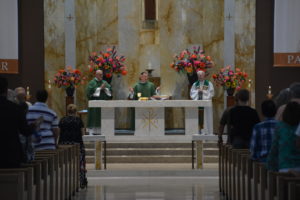Francis: we are called to immerse ourselves in the ocean of mercy
By VISarchive 02
Vatican City, 1 January 2016 (VIS) – Today, solemnity of Holy Mary Mother of God and the octave of Christmas, the Holy Father presided at Mass in the Vatican Basilica, concelebrated by cardinals, bishops and priests and attended by the Pueri Cantores, who have concluded their fortieth International Congress. Today is also the 49 th World Day of Peace, whose theme this year is “Overcome difference and win peace”.
The following is the full text of the homily pronounced by Pope Francis:
“We have heard the words of the Apostle Paul: ‘When the fullness of time had come, God sent his Son, born of a woman’. What does it mean to say that Jesus was born in ‘the fullness of time’? If we consider that particular moment of history, we might quickly be deluded. Rome had subjugated a great part of the known world by her military might. The Emperor Augustus had come to power after five civil wars. Israel itself had been conquered by the Roman Empire and the Chosen People had lost their freedom. For Jesus’ contemporaries, it was certainly not the best of times. To define the fullness of time, then, we should not look to the geopolitical sphere.
“Another interpretation is needed, one which views that fullness from God’s standpoint. It is when God decided that the time had come to fulfil His promise, that the fullness of time came for humanity. History does not determine the birth of Christ; rather, His coming into the world enables history to attain its fullness. For this reason, the birth of the Son of God inaugurates a new era, a new computation of time, the era which witnesses the fulfilment of the ancient promise. As the author of the Letter to the Hebrews writes: ‘God spoke to our ancestors in many and various ways by the prophets, but in these last days He has spoken to us by a Son, whom He appointed heir of all things, through whom He also created the world. He is the reflection of God’s glory and the exact imprint of God’s very being, and He sustains all things by His powerful word’. The fullness of time, then, is the presence of God Himself in our history. Now we can see His glory, which shines forth in the poverty of a stable; we can be encouraged and sustained by His Word, made ‘little’ in a baby. Thanks to Him, our time can find its fullness. The use of our personal time can also find its fullness in the encounter with Jesus Christ, God made man.
“Nonetheless, this mystery constantly clashes with the dramatic experience of human history. Each day, as we seek to be sustained by the signs of God’s presence, we encounter new signs to the contrary, negative signs which tend to make us think instead that He is absent. The fullness of time seems to fade before the countless forms of injustice and violence which daily wound our human family. Sometimes we ask ourselves how it is possible that human injustice persists unabated, and that the arrogance of the powerful continues to demean the weak, relegating them to the most squalid outskirts of our world. We ask how long human evil will continue to sow violence and hatred in our world, reaping innocent victims. How can the fullness of time have come when we are witnessing hordes of men, women and children fleeing war, hunger and persecution, ready to risk their lives simply to encounter respect for their fundamental rights? A torrent of misery, swollen by sin, seems to contradict the fullness of time brought by Christ. Remember, dear pueri cantores, this was the third question you asked me yesterday: how do we explain this… even children are aware of this.
“And yet this swollen torrent is powerless before the ocean of mercy which floods our world. All of us are called to immerse ourselves in this ocean, to let ourselves be reborn, to overcome the indifference which blocks solidarity, and to leave behind the false neutrality which prevents sharing. The grace of Christ, which brings our hope of salvation to fulfilment, leads us to cooperate with Him in building an ever more just and fraternal world, a world in which every person and every creature can dwell in peace, in the harmony of God’s original creation.
“At the beginning of a new year, the Church invites us to contemplate Mary’s divine maternity as an icon of peace. The ancient promise finds fulfilment in her person. She believed in the words of the angel, conceived her Son and thus became the Mother of the Lord. Through her, through her ‘yes’, the fullness of time came about. The Gospel we have just heard tells us that the Virgin Mary ‘treasured all these words and pondered them in her heart’. She appears to us as a vessel filled to the brim with the memory of Jesus, as the Seat of Wisdom to whom we can have recourse to understand His teaching aright. Today Mary makes it possible for us to grasp the meaning of events which affect us personally, events which also affect our families, our countries and the entire world. Where philosophical reason and political negotiation cannot arrive, there the power of faith, which brings the grace of Christ’s Gospel, can arrive, opening ever new pathways to reason and to negotiation.
“Blessed are you, Mary, for you gave the Son of God to our world. But even more blessed are you for having believed in Him. Full of faith, you conceived Jesus first in your heart and then in your womb, and thus became the Mother of all believers. Send us, O Mother, your blessing on this day consecrated to your honour. Show us the face of Jesus your Son, Who bestows upon the entire world mercy and peace. Amen”.
Source:: Vatican Information Service
Categories
From the Desk of Fr. JohnSs. Peter & Paul NewsU.S. Conf. of Catholic BishopsVatican Information ServiceWhat's HappeningUpcoming Events



